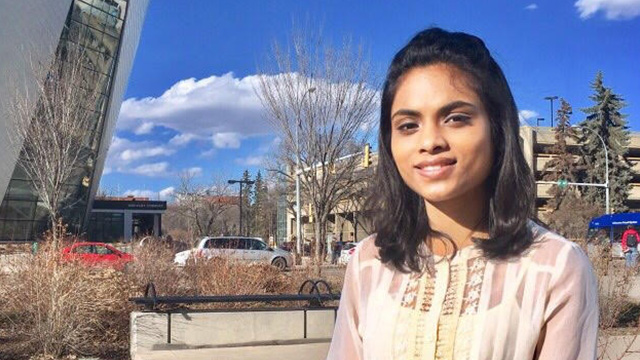
Neuroscience PhD graduate Farhia Haque is now a post-doctoral fellow at the University of Victoria, continuing her spinal-cord research.
A serious student with a deep love of adventure, Farhia Haque, '19 PhD, used to think she had left Canada in her rearview mirror forever. But life had other plans for her.
Haque moved across the globe for a master's in science at the Australian National University after undergraduate studies at the University of Toronto (Mississauga). When it came time to find the best fit for a PhD in neuroscience, the University of Alberta came out on top. "I did have a few people warning me about the infamous Alberta winters," she recalls. Still, she didn't hesitate to return from Canberra, where the average January temperature is 30C, to the frozen north. "I guess I wanted to experience it for myself," she says. "I really enjoy going to different places to explore new things."
A scholarship from the Neuroscience and Mental Health Institute (NMHI) cemented her choice, recalls Haque. "NMHI has been absolutely wonderful," she says. On top of their generous financial support, Haque fondly remembers the way they connected students with their academic peers and the institute's numerous avenues for career growth.
Haque found a trusted mentor in supervisor Simon Gosgnach, associate professor of physiology in the Faculty of Medicine & Dentistry working in the areas of locomotion and the spinal cord circuit. "He is such an astute scholar, and along the way I have learned so much from him," she says. He created an atmosphere where she was free to disagree, share concerns and discuss anything she needed to, she recalls, and "for that and much more, I will always be grateful to him."
Haque's PhD research revolved around the locomotor central pattern generator (CPG), a neural circuit in the spinal cord that controls movements such as walking, running and swimming. Specific subregions of the brain send down signals that fine-tune the output of this circuit, and Haque worked with Gosgnach's lab on one genetically defined group of spinal neurons in the locomotor CPG. She discovered that these WT1 spinal neurons affect our ability to move our left and right legs independently of each other. "If we didn't have these WT1 spinal neurons, we might intermittently hop like bunnies while walking," she says.
The people's choice
That bunny analogy is the perfect example of one of Haque's special talents-her ability to share her complex research in a creative and accessible way. In 2017, she was recognized for this when she won the People's Choice Award at the Three Minute Thesis competition hosted by the Faculty of Graduate Studies and Research. Winning for her presentation, "Rogue Soldiers: Neurons That Help Us Walk," is "the cherry on top" of a list of her favourite memories from the U of A.
Underpinning her academic pursuits were the personal connections she made on campus. "Since I have moved around a lot for my education, I truly cherish the friendships I make along the way," says Haque. "Edmonton's harsh winter was bearable for the great company I always had."
Moving into the unknown
She struggles to put into words how it felt to graduate, finally settling on "surreal." A compressed timeline may have contributed to that feeling-she had to pack for another imminent move within a week of defending her thesis. Walking across the convocation stage was only the beginning of Haque's next adventure.
Today, Haque is a post-doctoral fellow at the University of Victoria. In a natural transition from her PhD work, she's investigating the circuit in the midbrain that sends down the commanding signal to the spinal cord CPG. "I'm still uncertain about where my research will take me," she says when asked what might come next, "but I am excited to find out."
Her commitment to continue her studies, and the support of her family and partner, have motivated Haque through the rigours of graduate school. She knows burnout can occur, but she says drawing clear boundaries and setting realistic goals can be a big help to anyone who is struggling.
"Sometimes it will take a couple of trials, but eventually I think all grad students become good at managing their time," she says. "You're almost there. Buckle up for a tiny bit longer and you will be rewarded immensely."